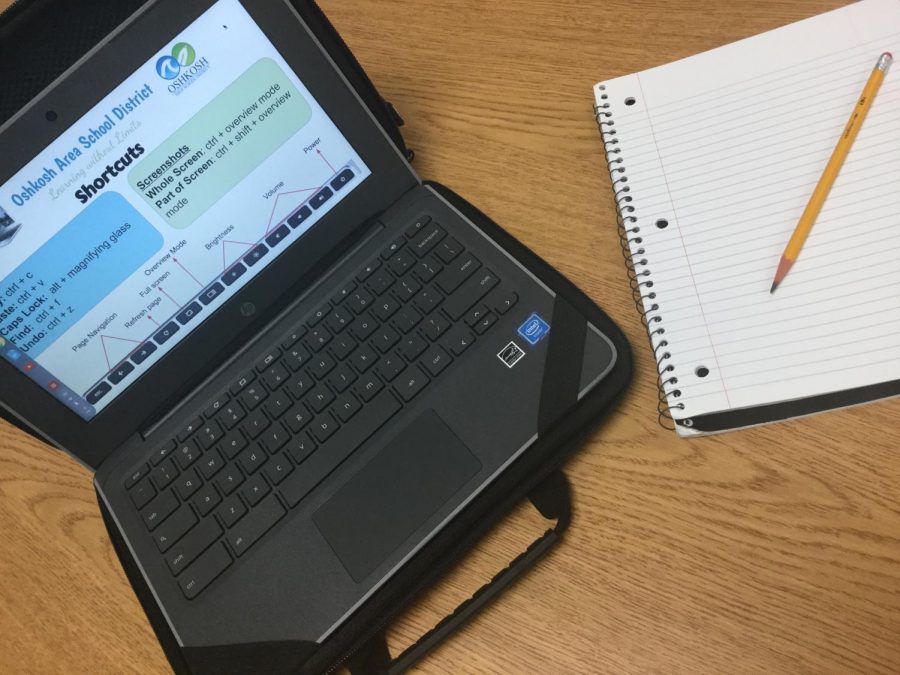Chromebooks at North: four years later
How has the introduction of Chromebooks affected education at Oshkosh North?
October 10, 2019
Five years ago, the Oshkosh Area School District (OASD) researched 1-to-1 technology for students in aim of technology-centered learning. However, data from these past five years shows no dramatic changes in their effectiveness in education.
How much of a difference—good or bad—are Chromebooks making within Oshkosh North? There are many ways to investigate how the money put into the initiative has affected students’ learning.
Probably the largest signal of the technology’s effect on students in the district is through their grade point average (GPA). When comparing the cumulative GPAs from before Chromebooks (2014-2015 school year and earlier) and after Chromebooks (2015-2016—2018-2019), a dramatic difference could signify a positive or negative effect on student grades potentially caused by the presence of Chromebooks.
Dr. David Gundlach, deputy superintendent of the OASD, stated that although a change in GPA may be observed, it may not be caused by the Chromebooks.
“There are many factors that go into the average GPA of a school community,” said Gundlach. “While there may be a correlation to a change in GPA that does not mean that there was causation.”
However, data from OASD shows that although the 2015-2016 school year did see a small jump of about 0.1, there is no dramatic change from GPAs before compared to after Chromebooks were introduced at Oshkosh North. In fact, the same data shows that Oshkosh North had a higher cumulative GPA in the 2013-2014 school year—before the introduction of Chromebooks.
So even if North has not seen a decrease in GPA since the 2014 referendum, Chromebooks have certainly not shown dramatic proof of improvement as far as grades go.
This could potentially be caused by misuse of the 1-to-1 technology. Since the 2015-2016 school year, improper network use has doubled according to data from Dean of Students, LeeAnn Gauthier. In addition, improper use of electronic devices has increased by over eight times since then, although cell phone use is a considerable contributor to this total.
So have Chromebooks been beneficial to Oshkosh North High School? Unfortunately, the answer is not very clear cut and not easily measurable with data alone due to large amounts of variability.
Instead, the advantages can only really be measured by those who interact with them daily: the teachers and students.
Most teachers say that Chromebooks give students much better access to class materials than before 2015.
“We definitely need [Chromebooks] because of the ebooks.” said Geometry teacher Bryan Dorn.
Using Chromebooks allows students to avoid lugging around huge textbooks in their backpacks; it is the students’ “one-stop-shop” as put by U.S. History teacher Eric Clark.
Junior Jack Leggett agrees.
“The Chromebooks are especially good for students who don’t have computers at home so they can have access to the internet,” Leggett said.
Internet access also allows students and teachers to easily manage their classwork through programs like Infinite Campus, Canvas, and Google Docs.
“Chromebooks have a lot of storage,” said senior Touger Yang. “I can keep everything in there and keep it organized.”
Although the internet is now imperative to learning, this convenience is often misused, with distractions like games and Netflix regularly taking students’ attention—as well as providing a means of cheating.
“People will be unfocused and get distracted,” said Yang. “They do whatever they want to do instead of doing work.”
Teachers like biology teacher Tim Buerger recognize this issue.
“It probably is not the most productive thing for kids to have all the time, but it is nice to have it when they need to do academic things,” said Buerger. “I don’t see it having a great impact as far as the negatives.”
Gundlach agrees that the Chromebooks increase student engagement in learning, “The research would show that [Chromebooks do] increase student engagement and achievement,” Gundlach said. “But that’s not the full reason we are [giving students Chromebooks]. We’re doing this to prepare students for the world they are going to go into. The ultimate goal is to provide students with learning activities in their chemistry class, their English class, and their math class that start to reflect what’s going on outside of school.”
Following the approval of the 2014 Referendum for Learning, the district set out to utilize part of the annual $3.95 million referendum to “Research [the] purchase of technology equipment” and “create [a] professional development plan” for the introduction of technology-centered learning.
Beginning with the 2015-2016 school year, the OASD put a brand new Chromebook into the hands of every high school student for the purpose of “prepar[ing] them for the world they will lead in” and “to remove limitations on the learning environment” according to the Technology page on the OASD website.
Although data can show academic success from the introduction of Chromebooks, it appears that the initiative has been successful in a much greater way than this.
“Today’s world has problems that need solving with innovative and creative solutions,” said instructional technology coach Deb Norton. “[Using the Chromebooks] students will also be able to take an active role in achieving and demonstrating competency in their learning goals through the use of instructional technology methods that will prepare them for the advanced technological world they live in.
Through the computers, students are acquiring skills that they will be required to know in a constantly advancing in technology. According to a study by the Brookings Institution, jobs requiring the use of digital technology increased by 59% from 2002-2016. Many similar studies have also shown the importance of this basic knowledge of technology in the majority of jobs, and the number is only expected to increase.
As students use technology daily, they prepare themselves for a world in which they will need it—learning how they will learn and working how they will work.
“To be effective in the 21st century, citizens and workers must be able to exhibit a range of functional and critical thinking skills related to information, media and technology,” said Principal Kiffmeyer. “Having the Chromebooks has helped students be ready for the world, no matter if they are entering the workforce, college, or military.”
The benefit of the Chromebooks at North cannot truly be measured by numbers or degraded by common misuse. Chromebooks are an extremely useful resource, valuable to those who take advantage of it.


